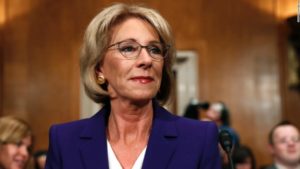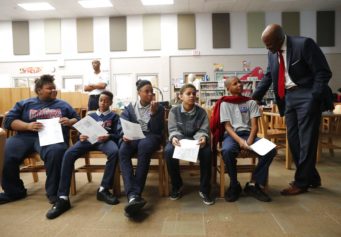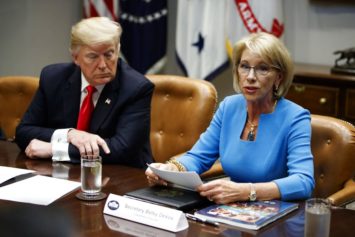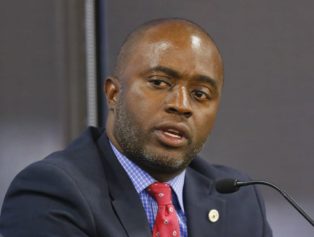
New U.S. Education Secretary Betsy DeVos. Image courtesy of CNN.
With the recent confirmation of Republican Elisabeth “Betsy” DeVos as the U.S. Department of Education’s chief officer, many wonder what the billionaire’s nomination means for Black and low-income children. DeVos, an entrepreneur and charter school founder with lucrative ties to “school-choice” advocates, has utilized her vast resources to influence educational policy towards privatization for over a decade.
Who is Betsy DeVos?
In November, President Donald Trump tapped DeVos for the Secretary of Education nomination. Like Trump, DeVos has never held an elected office or governmental position until the Senate confirmed the appointment on Feb. 7.
Prior to her confirmation, DeVos was the chairman of The Windquest Group, a private investment management firm presided over by her husband, entrepreneur Dick DeVos. If the DeVos family name is familiar, it is for good reason. Dick DeVos is the son of Richard DeVos Sr., co-founder of the billion-dollar, multilevel marketing company Amway, effectively making the DeVoses one of the wealthiest families in the United States. Betsy and Dick DeVos have used their fortune to donate millions of dollars to Republican candidates over the years. DeVos herself was elected chairwoman of the Michigan Republican Party four times, most recently in 2015.
Aside from her career as a political donor, Devos’ resume is void of any formal experience or background in the field of education. However, that lack of experience has not stopped her from leveraging massive amounts of money and influence to push conservative educational policies. DeVos is the former chairwoman of the American Federation for Children, a pro-school choice foundation that seeks to give families access to select schools outside of their district through voucher programs.
School Choice: Neighborhood, Public and Charter Schools
The school-choice movement seeks to address educational disparities by allowing families to exercise a greater degree of choice in school selection. Ideally, children living in zip codes with underperforming neighborhood schools would have the chance to compete with other children in the county for acceptance into higher-performing schools via lotteries or admission tests. This counters the standard neighborhood school system in which children are filtered to the neighborhood or “feeder schools” in their communities.
On the surface school choice seems like a great option for Black children who populate low-income areas. Those who are academically successful may be able to attend top-tier public schools or other magnet, private and charter schools that would not admit them otherwise. Despite this benefit, the school-choice model produces many unintended consequences that advocates may or may not be aware of. In an academic paper entitled The Distributional Consequences of Public School Choice, Christopher Avery, Professor of Public Policy and Management at Harvard University, and Parag A. Pathak, Professor of Economics at the Massachusetts Institute of Technology, illustrate how the school-choice model exacerbates educational inequity by influencing families’ housing choices.
“Our analysis shows that market forces can undercut this approach, for if a school choice plan succeeds in narrowing the quality range between the lowest- and highest-quality schools, that change can be expected to [provide] incentives for the lowest and highest types to exit from the town’s public schools,” the authors report.
As more nonwhite children and students from lower-income families are admitted into higher-performing schools, families with the luxury of social mobility could opt out, choosing exclusive private schools or moving to live in school districts that are geographically inaccessible to less-privileged families, producing a “white flight” effect. Many private schools that are top choices for affluent families are inconvenient for children residing in low-income areas to travel to, or they do not participate in the voucher and lottery programs that school-choice model proponents support. The authors determined that even when the school-choice model produces higher-performing schools in lower-income communities, housing values in these neighborhoods rise, pricing local families out of their homes.
School-choice proponents like DeVos profit greatly from the privatization of public schools and the desperation of Black parents seeking fair educational opportunities for their children. Often, our communities do not see the long-term consequences of for-profit charter schools and voucher systems. The school-choice model is merely a band-aid that neglects the underlying racial and economic disparities that have created educational inequality in this nation. Ideally, educational equity would look like an even distribution of resources; a system that allows all schools to obtain the funding necessary to retain experienced teachers and quality academic resources.
Gabrielle Clark is an independent writer and community-conscious creator on a path of liberation. You can follow her @allwolfnosheep.


